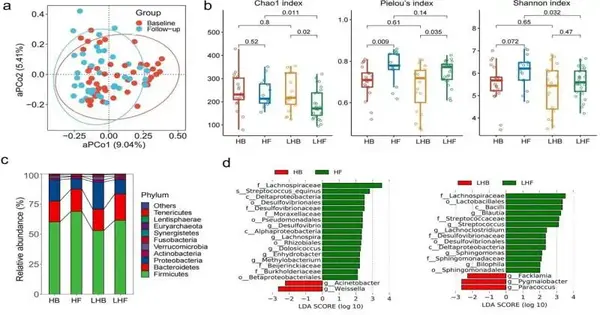Researchers from AIage Life Science, a probiotics manufacturer in China, looked into the microflora that lives in the guts of centenarians because there is growing scientific evidence showing how the gut microbiota affects human health.
In the study, “Longevity of centenarians is reflected by the gut microbiome with youth-associated signatures,” which was published in Nature Aging, the researchers looked at the microbiomes of 1,575 people ranging in age from 20 to 117, 297 of whom were reported to be 100 years of age or older. In the same journal issue, a research briefing on the study with the title “Youth-associated signatures in the gut microbiome of centenarians” was released.
Five age-related groups of participants were assessed. Old adults (n = 386, 66–85 years), young adults (n = 314, 20–44 years), a middle-aged group (n = 277, 45–65 years), nonagenarians (n = 301, 90–99 years), and a centenarian cohort (n = 297, 100–117 years) were the age groups represented.
The gut microbiome signature of centenarians, which has an excess of Bacteroides species, is similar to that of young adults, according to the researchers: an increase in species evenness (species have similar abundances), an enrichment of potentially advantageous species from the phylum Bacteroidetes, and a decrease in potential pathobionts (harmless but capable of turning pathogenic under specific conditions).
Over the course of an 18-month period, 45 centenarians were tested twice. The group’s findings showed that the distinctive species evenness and low pathobionts continued to evolve and were improved upon or preserved as centenarians aged.
The researchers assert that this microbiome signature is linked to longevity, which they found in their study, and state that this may counteract the senescence or chronic diseases that typically accompany aging, which this study could not have observed.
In an effort to identify microorganisms that can increase human longevity, scientists are currently isolating thousands of bacterial strains from centenarians and evaluating their benefits in animal models. The company the researchers work for, AIage Life Science, already sells a probiotic product that makes exactly that claim, so the future research should be of enormous benefit to them.
How old?
A quick aside for anyone wondering if the oldest living person on the planet participated in this study (up to 117): It is unclear and remarkably unstated anywhere in the paper whether there is a participant who claims to be 117 years old or if this is an arbitrary range on the researchers’ part. The former is implied by the way it is written, and this needs to be briefly explored as it raises a potential problem with how the study should be interpreted.
Since birth records were not kept in Guangxi Province prior to 1949, the participants’ ages were determined by participant self-reporting (at some point in their lives). As a result, anyone who was older than 72 at the time of the study is considered to have an unverifiable age.
Contrary to Western culture, Chinese culture places more of an emphasis on growing old. It’s possible that some people might try to lie when asked their age in a society where elders have high status. The world’s oldest living person could have accidentally wandered into a study on aging, or we could accept—without any proof—the alternative.
All participants were community residents who made Guangxi Province, China, their permanent home, according to the researchers. The high percentage of centenarians in the area is well known. Notably, Luo Meizhen, who previously held the record for the oldest person to have ever lived, was born in this same neighborhood and lived to be 127 years old. Despite the fact that there were no birth records in Guangxi Province prior to 1949, Chinese authorities managed to confirm her age. She would have been 61 when her son was born, making her the oldest person to have given birth at the time, which presented a math challenge.
This study could be replicated in many locations around the world where there are people over 100 who have verifiable birth records. For at least another 26 years, the Chinese province of Guangxi won’t be included in the list of centenarians.
More information: Shifu Pang et al, Longevity of centenarians is reflected by the gut microbiome with youth-associated signatures, Nature Aging (2023). DOI: 10.1038/s43587-023-00389-y
Youth-associated signatures in the gut microbiome of centenarians, Nature Aging (2023). DOI: 10.1038/s43587-023-00395-0





